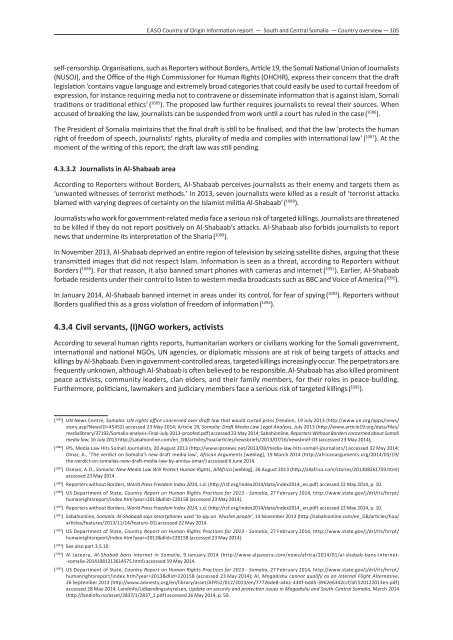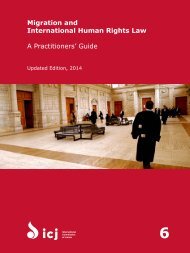Create successful ePaper yourself
Turn your PDF publications into a flip-book with our unique Google optimized e-Paper software.
EASO Country of Origin Information report — South and Central <strong>Somalia</strong> — Country overview — 105<br />
self‐censorship. Organisations, such as <strong>Report</strong>ers without Borders, Article 19, the Somali National Union of Journalists<br />
(NUSOJ), and the Office of the High Commissioner for Human Rights (OHCHR), express their concern that the draft<br />
legislation ‘contains vague language and extremely broad categories that could easily be used to curtail freedom of<br />
expression, for instance requiring media not to contravene or disseminate information that is against Islam, Somali<br />
traditions or traditional ethics’ ( 1085 ). The proposed law further requires journalists to reveal their sources. When<br />
accused of breaking the law, journalists can be suspended from work until a court has ruled in the case ( 1086 ).<br />
The President of <strong>Somalia</strong> maintains that the final draft is still to be finalised, and that the law ‘protects the human<br />
right of freedom of speech, journalists’ rights, plurality of media and complies with international law’ ( 1087 ). At the<br />
moment of the writing of this report, the draft law was still pending.<br />
4.3.3.2 Journalists in Al‐Shabaab area<br />
According to <strong>Report</strong>ers without Borders, Al‐Shabaab perceives journalists as their enemy and targets them as<br />
‘unwanted witnesses of terrorist methods.’ In 2013, seven journalists were killed as a result of ‘terrorist attacks<br />
blamed with varying degrees of certainty on the Islamist militia Al‐Shabaab’ ( 1088 ).<br />
Journalists who work for government‐related media face a serious risk of targeted killings. Journalists are threatened<br />
to be killed if they do not report positively on Al‐Shabaab’s attacks. Al‐Shabaab also forbids journalists to report<br />
news that undermine its interpretation of the Sharia ( 1089 ).<br />
In November 2013, Al‐Shabaab deprived an entire region of television by seizing satellite dishes, arguing that these<br />
transmitted images that did not respect Islam. Information is seen as a threat, according to <strong>Report</strong>ers without<br />
Borders ( 1090 ). For that reason, it also banned smart phones with cameras and internet ( 1091 ). Earlier, Al‐Shabaab<br />
forbade residents under their control to listen to western media broadcasts such as BBC and Voice of America ( 1092 ).<br />
In January 2014, Al‐Shabaab banned internet in areas under its control, for fear of spying ( 1093 ). <strong>Report</strong>ers without<br />
Borders qualified this as a gross violation of freedom of information ( 1094 ).<br />
4.3.4 Civil servants, (I)NGO workers, activists<br />
According to several human rights reports, humanitarian workers or civilians working for the Somali government,<br />
international and national NGOs, UN agencies, or diplomatic missions are at risk of being targets of attacks and<br />
killings by Al‐Shabaab. Even in government‐controlled areas, targeted killings increasingly occur. The perpetrators are<br />
frequently unknown, although Al‐Shabaab is often believed to be responsible. Al‐Shabaab has also killed prominent<br />
peace activists, community leaders, clan elders, and their family members, for their roles in peace‐building.<br />
Furthermore, politicians, lawmakers and judiciary members face a serious risk of targeted killings ( 1095 ).<br />
( 1085 ) UN News Centre, <strong>Somalia</strong>: UN rights office concerned over draft law that would curtail press freedom, 19 July 2013 (http://www.un.org/apps/news/<br />
story.aspNewsID=45452) accessed 23 May 2014; Article 19, <strong>Somalia</strong>: Draft Media Law Legal Analysis, July 2013 (http://www.article19.org/data/files/<br />
medialibrary/37192/<strong>Somalia</strong>‐analysis‐Final‐July-2013-proofed.pdf) accessed 23 May 2014; Sabahionline, <strong>Report</strong>ers Without Borders concerned about Somali<br />
media law, 16 July 2013 http://sabahionline.com/en_GB/articles/hoa/articles/newsbriefs/2013/07/16/newsbrief-03 (accessed 23 May 2014);<br />
( 1086 ) IPS, Media Law Hits Somali Journalists, 20 August 2013 (http://www.ipsnews.net/2013/08/media‐law‐hits‐somali‐journalists/) accessed 32 May 2014;<br />
Omar, A., ‘The verdict on <strong>Somalia</strong>’s new draft media law’, African Arguments [weblog], 19 March 2014 (http://africanarguments.org/2014/03/19/<br />
the‐verdict‐on‐somalias‐new‐draft‐media‐law‐by‐annisa‐omar/) accessed 6 June 2014.<br />
( 1087 ) Osman, A.O., <strong>Somalia</strong>: New Media Law Will Protect Human Rights, AllAfrica [weblog], 26 August 2013 (http://allafrica.com/stories/201308261759.html)<br />
accessed 23 May 2014.<br />
( 1088 ) <strong>Report</strong>ers without Borders, World Press Freedom Index 2014, s.d. (http://rsf.org/index2014/data/index2014_en.pdf) accessed 22 May 2014, p. 10.<br />
( 1089 ) US Department of State, Country <strong>Report</strong> on Human Rights Practices for 2013 - <strong>Somalia</strong>, 27 February 2014, http://www.state.gov/j/drl/rls/hrrpt/<br />
humanrightsreport/index.htmyear=2013&dlid=220158 (accessed 23 May 2014).<br />
( 1090 ) <strong>Report</strong>ers without Borders, World Press Freedom Index 2014, s.d. (http://rsf.org/index2014/data/index2014_en.pdf) accessed 22 May 2014, p. 10.<br />
( 1091 ) Sabahionline, <strong>Somalia</strong>: Al‐Shabaab says smartphones used ‘to spy on `Muslim people’, 14 November 2013 (http://sabahionline.com/en_GB/articles/hoa/<br />
articles/features/2013/11/14/feature-01) accessed 22 May 2014.<br />
( 1092 ) US Department of State, Country <strong>Report</strong> on Human Rights Practices for 2013 - <strong>Somalia</strong>, 27 February 2014, http://www.state.gov/j/drl/rls/hrrpt/<br />
humanrightsreport/index.htmyear=2013&dlid=220158 (accessed 23 May 2014).<br />
( 1093 ) See also part 3.5.10.<br />
( 1094 ) Al Jazeera, Al‐Shabab bans internet in <strong>Somalia</strong>, 9 January 2014 (http://www.aljazeera.com/news/africa/2014/01/al‐shabab‐bans‐ internet‐<br />
‐somalia ‐20141981213614575.html) accessed 19 May 2014.<br />
( 1095 ) US Department of State, Country <strong>Report</strong> on Human Rights Practices for 2013 - <strong>Somalia</strong>, 27 February 2014, http://www.state.gov/j/drl/rls/hrrpt/<br />
humanrightsreport/index.htmyear=2013&dlid=220158 (accessed 23 May 2014); AI, Mogadishu cannot qualify as an Internal Flight Alternative,<br />
26 September 2013 (http://www.amnesty.org/en/library/asset/AFR52/012/2013/en/77726de8-a461-430f‐bdd5-3962e6342ccf/afr520122013en.pdf)<br />
accessed 28 May 2014; Landinfo/Udlændingsstyrelsen, Update on security and protection issues in Mogadishu and South‐Central <strong>Somalia</strong>, March 2014<br />
(http://landinfo.no/asset/2837/1/2837_1.pdf) accessed 26 May 2014, p. 50.



